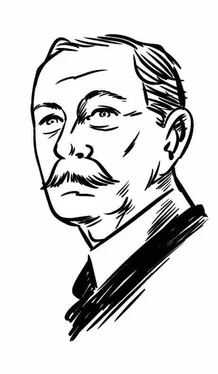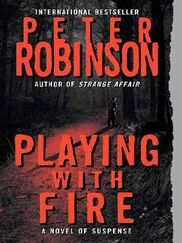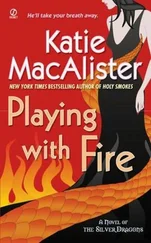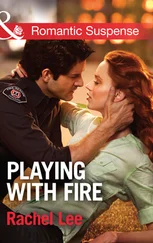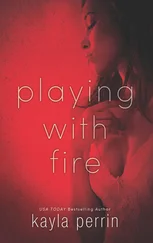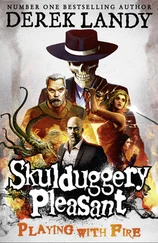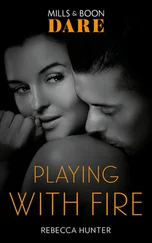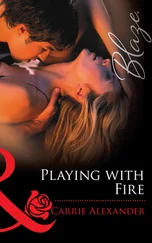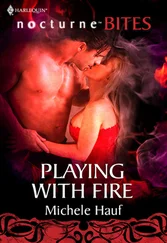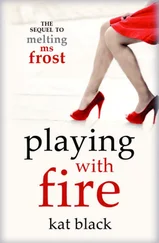Arthur Doyle - Playing With Fire
Здесь есть возможность читать онлайн «Arthur Doyle - Playing With Fire» весь текст электронной книги совершенно бесплатно (целиком полную версию без сокращений). В некоторых случаях можно слушать аудио, скачать через торрент в формате fb2 и присутствует краткое содержание. Жанр: Детектив, на английском языке. Описание произведения, (предисловие) а так же отзывы посетителей доступны на портале библиотеки ЛибКат.
- Название:Playing With Fire
- Автор:
- Жанр:
- Год:неизвестен
- ISBN:нет данных
- Рейтинг книги:4 / 5. Голосов: 1
-
Избранное:Добавить в избранное
- Отзывы:
-
Ваша оценка:
- 80
- 1
- 2
- 3
- 4
- 5
Playing With Fire: краткое содержание, описание и аннотация
Предлагаем к чтению аннотацию, описание, краткое содержание или предисловие (зависит от того, что написал сам автор книги «Playing With Fire»). Если вы не нашли необходимую информацию о книге — напишите в комментариях, мы постараемся отыскать её.
Playing With Fire — читать онлайн бесплатно полную книгу (весь текст) целиком
Ниже представлен текст книги, разбитый по страницам. Система сохранения места последней прочитанной страницы, позволяет с удобством читать онлайн бесплатно книгу «Playing With Fire», без необходимости каждый раз заново искать на чём Вы остановились. Поставьте закладку, и сможете в любой момент перейти на страницу, на которой закончили чтение.
Интервал:
Закладка:

Arthur Conan Doyle
Playing With Fire
I cannot pretend to say what occurred on the 14th of April last at No. 17 Badderly Gardens. Put down in black and white, my surmise might seem too crude, too grotesque, for serious consideration. And yet that something did occur, and that it was of a nature which will leave its mark upon every one of us for the rest of our lives, is as certain as the unanimous testimony of five witnesses can make it. I will not enter into any argument or speculation. I will only give a plain statement, which will be submitted to John Moir, Harvey Deacon, and Mrs. Delamere, and withheld from publication unless they are prepared to corroborate every detail. I cannot obtain the sanction of Paul Le Duc, for he appears to have left the country.
It was John Moir (the well-known senior partner of Moir, Moir, and Sanderson) who had originally turned our attention to occult subjects. He had, like many very hard and practical men of business, a mystic side to his nature, which had led him to the examination, and eventually to the acceptance, of those elusive phenomena which are grouped together with much that is foolish, and much that is fraudulent, under the common heading of spiritualism. His researches which had begun with an open mind, ended unhappily in dogma, and he became as positive and fanatical as any other bigot. He represented in our little group the body of men who have turned these singular phenomena into a new religion.
Mrs. Delamere, our medium, was his sister, the wife of Delamere, the rising sculptor. Our experience had shown us that to work on these subjects without a medium was as futile as for an astronomer to make observations without a telescope. On the other hand, the introduction of a paid medium was hateful to all of us. Was it not obvious that he or she would feel bound to return some result for money received, and that the temptation to fraud would be an overpowering one? No phenomena could be relied upon which were produced at a guinea an hour. But, fortunately, Moir had discovered that his sister was mediumistic – in other words, that she was a battery of that animal magnetic force which is the only form of energy which is subtle enough to be acted upon from the spiritual plane as well as from our own material one. Of course, when I say this, I do not mean to beg the question; but I am simply indicating the theories upon which we were ourselves, rightly or wrongly, explaining what we saw. The lady came, not altogether with the approval of her husband, and though she never gave indications of any very great psychic force, we were able, at least, to obtain those usual phenomena of message-tilting which are at the same time so puerile and so inexplicable. Every Sunday evening we met in Harvey Deacon's studio at Badderly Gardens, the next house to the corner of Merton Park Road.
Harvey Deacon's imaginative work in art would prepare anyone to find that he was an ardent lover of everything which was outre and sensational. A certain picturesqueness in the study of the occult had been the quality which had originally attracted him to it, but his attention was speedily arrested by some of those phenomena to which I have referred, and he was coming rapidly to the conclusion that what he had looked upon as an amusing romance and an after-dinner entertainment was really a very formidable reality. He is a man with a remarkably clear and logical brain – a true descendant of his ancestor, the well-known Scottish professor – and he represented in our small circle the critical element, the man who has no prejudices, is prepared to follow facts as far as he can see them, and refuses to theorise in advance of his data. His caution annoyed Moir as much as the latter's robust faith amused Deacon, but each in his own way was equally keen upon the matter.
And I? What am I to say that I represented? I was not the devotee. I was not the scientific critic. Perhaps the best that I can claim for myself is that I was the dilettante man about town, anxious to be in the swim of every fresh movement, thankful for any new sensation which would take me out of myself and open up fresh possibilities of existence. I am not an enthusiast myself, but I like the company of those who are. Moir's talk, which made me feel as if we had a private pass-key through the door of death, filled me with a vague contentment. The soothing atmosphere of the seance with the darkened lights was delightful to me. In a word, the thing amused me, and so I was there.
It was, as I have said, upon the 14th of April last that the very singular event which I am about to put upon record took place. I was the first of the men to arrive at the studio, but Mrs. Delamere was already there, having had afternoon tea with Mrs. Harvey Deacon. The two ladies and Deacon himself were standing in front of an unfinished picture of his upon the easel. I am not an expert in art, and I have never professed to understand what Harvey Deacon meant by his pictures; but I could see in this instance that it was all very clever and imaginative, fairies and animals and allegorical figures of all sorts. The ladies were loud in their praises, and indeed the colour effect was a remarkable one.
"What do you think of it, Markham?" he asked.
"Well, it's above me," said I. "These beasts – what are they?"
"Mythical monsters, imaginary creatures, heraldic emblems – a sort of weird, bizarre procession of them."
"With a white horse in front!"
"It's not a horse," said he, rather testily – which was surprising, for he was a very good-humoured fellow as a rule, and hardly ever took himself seriously.
"What is it, then?"
"Can't you see the horn in front? It's a unicorn. I told you they were heraldic beasts. Can't you recognise one?"
"Very sorry, Deacon," said I, for he really seemed to be annoyed.
He laughed at his own irritation.
"Excuse me, Markham!" said he; "the fact is that I have had an awful job over the beast. All day I have been painting him in and painting him out, and trying to imagine what a real live, ramping unicorn would look like. At last I got him, as I hoped; so when you failed to recognise it, it took me on the raw."
"Why, of course it's a unicorn," said I, for he was evidently depressed at my obtuseness. "I can see the horn quite plainly, but I never saw a unicorn except beside the Royal Arms, and so I never thought of the creature. And those others are griffins and cockatrices, and dragons of sorts?"
"Yes, I had no difficulty with them. It was the unicorn which bothered me. However, there's an end of it until to-morrow." He turned the picture round upon the easel, and we all chatted about other subjects.
Moir was late that evening, and when he did arrive he brought with him, rather to our surprise, a small, stout Frenchman, whom he introduced as Monsieur Paul Le Duc. I say to our surprise, for we held a theory that any intrusion into our spiritual circle deranged the conditions, and introduced an element of suspicion. We knew that we could trust each other, but all our results were vitiated by the presence of an outsider. However, Moir soon reconciled us to the innovation. Monsieur Paul Le Duc was a famous student of occultism, a seer, a medium, and a mystic. He was travelling in England with a letter of introduction to Moir from the President of the Parisian brothers of the Rosy Cross. What more natural than that he should bring him to our little seance, or that we should feet honoured by his presence?
He was, as I have said, a small stout man, undistinguished in appearance, with a broad, smooth, clean-shaven face, remarkable only for a pair of large, brown, velvety eyes, staring vaguely out in front of him. He was well dressed, with the manners of a gentleman, and his curious little turns of English speech set the ladies smiling. Mrs. Deacon had a prejudice against our researches and left the room, upon which we lowered the lights, as was our custom, and drew up our chairs to the square mahogany table which stood in the centre of the studio. The light was subdued, but sufficient to allow us to see each other quite plaiuly. I remember that I could even observe the curious, podgy little square-topped hands which the Frenchman laid upon the table.
Читать дальшеИнтервал:
Закладка:
Похожие книги на «Playing With Fire»
Представляем Вашему вниманию похожие книги на «Playing With Fire» списком для выбора. Мы отобрали схожую по названию и смыслу литературу в надежде предоставить читателям больше вариантов отыскать новые, интересные, ещё непрочитанные произведения.
Обсуждение, отзывы о книге «Playing With Fire» и просто собственные мнения читателей. Оставьте ваши комментарии, напишите, что Вы думаете о произведении, его смысле или главных героях. Укажите что конкретно понравилось, а что нет, и почему Вы так считаете.
